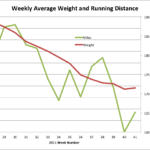Photo By: Unsplash, Source, CC
The Benefits of Intermittent Fasting: How to Lose Weight and Boost Your Health
Intermittent fasting is an increasingly popular dieting approach that has been proven to offer a variety of health and weight loss benefits. It involves alternating periods of eating and fasting, which helps to reduce excess calorie intake and maximize weight loss. Additionally, intermittent fasting helps to regulate hormone levels, improve metabolic health, and even help reduce inflammation. Here are some of the key benefits of intermittent fasting and a few tips on how to get started:
1. Weight Loss
Intermittent fasting helps to reduce calories by shortening the length of time in which one can eat. By alternating periods of eating and fasting, it restricts total calorie intake, resulting in weight loss. Additionally, it helps to regulate hormone levels, specifically leptin and ghrelin, which control hunger and cravings. Through this approach, it becomes easier to control one’s appetite and maintain healthy calorie consumption levels.
2. Improved Metabolic Health
Intermittent fasting has been linked to a variety of metabolic health benefits, including improved insulin sensitivity and an increase in the production of growth hormones. This helps to stabilize blood sugar levels and improve overall health. It can also play a role in reducing cholesterol and triglyceride levels, aiding in the prevention of heart disease.
3. Reduced Inflammation
Intermittent fasting has been proven to reduce inflammation, a key factor in obesity and other chronic diseases. Studies have shown that fasting can reduce fat cells, which contain inflammatory compounds. By reducing inflammation, it helps to reduce the risk of developing diseases and other health issues.
Tips for Getting Started
- Pick a fasting window that works for you. Many people find it easier to fast for 16-24 hours twice a week, but this is different from person to person. Start with a timeframe that works for you, and adjust as needed.
- Drink plenty of water. Staying hydrated is key to staying healthy and helping your body adapt to fasting. If you find yourself getting hungry or irritable, try drinking water first to see if it helps.
- Eat nutrient-dense foods. Intermittent fasting is not only about reducing calorie intake; it’s also about eating nutritious and nourishing foods. Focus on eating whole foods such as fruits, vegetables, lean proteins, and healthy fats.
- Stay active. Exercise is an important component of any healthy lifestyle, and it can also help make intermittent fasting easier. Exercise not only boosts metabolism, but it can help keep hunger at bay.
Intermittent fasting is a great way to lose weight and boost overall health. It not only helps to reduce calories and regulate hormones, but it can also help improve metabolic health and reduce inflammation. With a few simple tips, anyone can get started with intermittent fasting and start experiencing the benefits.



